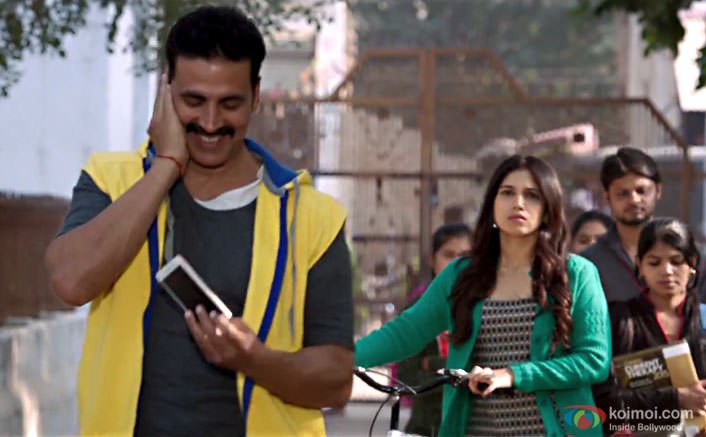Posted by Mayuri Bhattacharjee
Over the past few months, the cast and crew of Toilet Ek Prem Katha (TEPK) have become ambassadors of Swachh Bharat Mission, arguably the biggest toilet-building programme till date in India. As a sanitation professional (I don’t often review films, but I have reviewed quite a few toilets at Loo Watch), I can predict that very soon TEPK will be screened as educational and awareness material to urge people in rural India to use toilets instead of practising open defecation.
Also read: For A Toilet Inquilab, Feminism Must Talk Loos More Often
TEPK starts with a scene which is common in rural Uttar Pradesh. It’s dawn. A group of women are walking with lotas in their hands and ghoonghats over their heads. Gossip about mother-in-laws and husbands flow freely as they reach their toilet, i.e. a thick curtain of bushes. As they lift their saris and squat to do their ‘business’, a man waiting with the intention of harassing them charges his tractor towards the group. The gossip stops abruptly and the women hastily cover their faces with their ghoonghat. It’s a moment of shame, anger and helplessness.
This scene captures the reality of many women in rural India who are sexually harassed when they go out to defecate in the open due to the lack of access to toilets. It was an important point driven home by the director in the first few minutes of the film. The loo watcher in me was impressed! But not for long.
We meet Keshav Joshi (Akshay Kumar), our protagonist, a 36 year old mangalik who has been unable to find a bride because of his orthodox father’s superstitions.
One fine day he meets the girl of his dreams Jaya (Bhumi Pednekar) outside the toilet of a train coach. He falls in love and decides to get the girl. Now, what do Bollywood lovestruck heroes do in such situations? They stalk, right? We are supposed to believe street harassment is cute and taking photos of your crush without her permission with Sonu Nigam cooing ‘Has Mat Pagli’ in the background is Pikachu cute.
Jaya makes it clear that she has no interest in him but he persists, after all ‘ladki ke naa mein haan chupa hota hai’. Soon, Jaya falls for her stalker after he delivers a macho dialogue which made the male audience in the theatre erupt in whistles and orgasmic cheers. The initial excitement that I felt for the film disappeared amid the mad noise in the theatre. It is almost 2018. How many times should women repeat that: Stalking is harassment. Stalking can never be a sign of love!
Coming back to the movie, Jaya marries her stalker (sigh) and post suhaag raat (first night) she is shocked to learn that there is no toilet at Keshav’s home. Initially, Keshav tries to solve this problem through jugaad because his Panditji daddy thinks a toilet will pollute their house. But after a scary incident, Jaya tells Keshav enough of jugaad, find a solution!
Keshav realises he has to change the ‘soch’ of people around him before getting a ‘shauchalaya’. In this quest he stands up against his family and the entire village. He questions the hypocrisy of the village council members who would rather shit by the river instead of using a toilet at home. As a person working on sanitation behaviour change, I must commend the director for bringing up the casteist notions of ‘purity and pollution’ which prevent many Hindu households in northern India from building a household latrine. In fact, R.I.C.E. (Research Institute for Compassionate Economics) had found in a study in rural northern India that Hindus are more likely than Muslims to respond that open defecation away from the home is pure, while using a latrine near the home is not pure.
So, after a lot of drama and tears everything falls into place in the end, including a new public toilet in the village. The sudden behaviour change in the people of the village felt like magic to me and their reason to build & use toilets wasn’t that clear. The transformation in the soch of the community could have been shown in a better way.
TEPK had a lot of potential, but the normalisation of stalking left a bitter after taste. It was unnecessary and the director could have shown the characters of Jaya and Keshav falling in love without portraying the hero as a stalker.
However, TEPK is a sign that one can make a commercial film with the word ‘Toilet’ in it and get a star on board. I hope we have more commercial films dealing with other taboos and unglamorous issues such as manual scavenging, menstruation, among others. To be honest I want another film on toilets. But this time, a feminist film with Kangana Ranaut as the protagonist. Wishful thinking, but you never know.
Also read: Swachh Bharat Mission Hasn’t ‘Met’ Sustainable Menstruation. And That’s A Disaster | #ThePadEffect
Mayuri Bhattacharjee is the Programme Head and Director of Sikun Relief Foundation which works in northeast India on menstrual hygiene and WASH projects.
About the author(s)
Guest Writers are writers who occasionally write on FII.




